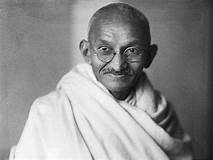By Kirsty Coleman-
Gandhi must have been a Vegan, when we examine his principles and the habits he adopted. He clearly was striving to respect the rights of animals. He helped promote the concept of veganism at its very least, this is evident in his writings
Upon pondering about different religions and their belief systems on not eating certain meat, or like Rastafarians, not eating meat at all, I began some research and soon stumbled across Gandhi. Was Gandhi a vegan?
The word ‘vegan’ was only invented in November 1944, by Donald Watson, the founder of The Vegan Society. The first newsletter from The Vegan Society records show there were only 25 members when it was first founded and it was not until 1949 that the word ‘vegan’ was given its first real definition. Only in 1964, did The Vegan Society become a registered charity. Gandhi was assassinated on 30 January 1948, so Gandhi couldn’t have called himself a vegan, as the society was too small for word to have spread so far so soon. However, he was brought up not eating meat, and later vouched not to eat meat, milk or eggs.
In 1888, the London Vegetarian Society split into two groups, leaving the original group at its base in Manchester. In 1891, Gandhi, as a law student in London, joined the society and went on to meet with the government in London in 1931, where he gave a talk for the London Vegetarian Society. An empowering quote by Gandhi from this speech, about which I feeling strongly is, “the only basis for having a vegetarian society and proclaiming a vegetarian principle is, and must be a moral one.” A decision should always be a moral one. It is not just a moral choice on behalf of the animals, it is a moral choice to help replenish the planet we live on, which humans have decayed.
In his book, ‘The Moral Basis of Vegetarianism’, Gandhi spoke about how animals with defects, carry these defects in their meat and milk. specifically writing about man, he sates“He does not seem to worry much about his health. He considers himself to be quite safe in his medical fortress in the shape of doctors, vaids and hakims. His main worry and concern is how to get wealth and position in society. This worry overshadows all the rest. Therefore, so long as some selfless scientist does not, as a result of patient research work, discover a vegetable substitute for milk and meat, man will go on taking meat and milk.” Even now, when we have an alternative to cow’s milk, an alternative to eating animal’s flesh, the majority of the human race still choose to continue with what they are accustomed to, the killing of animals, even though there is another way. Livestock are injected with antibiotics to try and prevent diseases, increase the growth of the farmed animals, and sometimes, to treat an actual illness so it doesn’t spread.
This can bring about antibiotic-resistant bacteria which is then present in the meat humans consume.
He also wrote, “I have always been in favour of pure vegetarian diet. But experience has taught me that in order to keep perfectly fit, vegetarian diet must include milk and milk products such as curds, butter, ghee etc. This is a significant departure from my original idea.” His comments appear to be contrary to a lifestyle we now know as veganism
At first, this seems as though he is going against what is now called ‘veganism’, especially as he eventually resorted to consuming goat’s milk to prevent deterioration of his health, despite stating he does not agree with consuming milk, and that the animal’s milk belongs only to its offspring. It is portrayed in many different lights how Gandhi felt towards consuming goat’s milk in the end, but
How Ghandi felt about the consumption of goat milk and animal products has been portrayed differently by different writers.
Gandhi once said how it was a “tragedy”, that he must consume milk for physical reasons, as he had abstained from milk because of his beliefs. Surely this says it all. As he said in his speech in London in 1933, “I am convinced that in the vast vegetable kingdom there must be some kind, which while supplying those necessary substances that we derive from milk and meat is free from their drawbacks, ethical and other.” Of course, now, we can consume soy milk, but back in 1933, this was not yet created. Soy milk is the kind which supplies the goodness we gain from milk, as we can healthily live by consuming soy milk, which is ethical, just as Gandhi wanted.
There is no doubt that Gandhi helped with the movement of veganism, despite the word ‘vegan’, being non-existent back then. There is evidence to show that people have been avoiding the slaughtering of animals, and use of animals for labour and clothes 2000 years ago. Vegetarianism was also called the ‘pythagoreon diet’ for a time, as Pythagoras practice being a vegetarian as well as sharing his view on it with the world; Pythagoras believed that all living beings had souls.
To conclude, there is a very strong argument that Gandhi was a vegan, but it cannot have been recorded in history, as veganism as we know it, didn’t exist back then.
There is a strong argument for suggesting Ghandi supported vegan principles. However, historical records cannot confirm this since the word ‘veganism’ had not been coined in Gandhi’s days.




